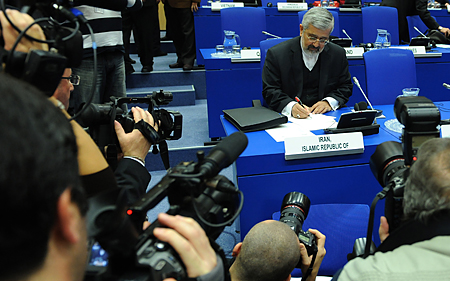
The Iranian ambassador to the International Atomic Energy Agency (IAEA) Ali Asghar Soltanieh (R) reviews documents before the opening of the board of governors conference at the agency headquarters in Vienna on November 18, 2011. The UN atomic watchdog's board was expected to pass a resolution of "deep and increasing concern" about Iran's nuclear activities after a damning new report from the Vienna-based body. (Photo: Samuel Kubani / AFP / Getty Images)
The Washington spin on the IAEA resolution agreed Thursday is that it “sharply criticizes” Iran — or, more accurately, expresses “deep and increasing concern about the unresolved issues” about the nuclear program Tehran insists is purely peaceful, but which the UN nuclear watchdog has alleged may have have included research work, particularly before 2003, into warhead design. But the IAEA resolution doesn’t even refer the matter to the U.N. Security Council, meaning that it won’t lead at this stage to any new U.N. sanctions. Measured against the pre-release hype suggesting that the report would be a game-changer, forcing nations skeptical of the U.S.-led effort to isolate Iran to join Washington’s cause, the IAEA resolution is something of a damp squib. Far from the “game changer” promised by some officials ahead of the report’s release, the resolution taking shape at the IAEA actually confirms that the “game” remains very much unchanged despite the latest report.
In the face of strong opposition led by China and Russia — and supported by much of the developing world — to turning up the heat on Tehran, the IAEA resolution avoids referring the issue to the U.N. Security Council. Moscow and Beijing had made clear they would block any meaningful new sanctions at the Council, but it appears that the Western nations aligned with the U.S. are unable to muster the necessary support at the IAEA for even referring the matter there right now.
While Russia, China, Turkey and others will certainly press Iran to “behave responsibly” (as Turkey’s foreign minister Ahmet Davutoglu put it Thursday), cooperate with the IAEA and refrain from using its nuclear program to pursue strategic weapons, they remain skeptical. Indeed, Moscow and Beijing have both publicly expressed skepticism over the new IAEA report, implying that political pressure from the U.S. camp played a role in shaping its conclusions — a narrative loudly proclaimed by Iran. And they’ve strongly opposed further sanctions, which they believe will not help break the stalemate. Indeed, Moscow has also taken the lead in pressing for a new approach to dealing with Iran that involves a progressive easing of sanctions as Iran increases cooperation with the IAEA. Russia insists Iran is ready for a negotiated solution to the standoff, and sees the sanctions push as counterproductive.
Moscow’s position is diametrically opposed to that of Washington, whose approach is premised on the idea that escalating economic pressure, and maintaining the proverbial “all options on the table” stance (code for the threat of military action), are essential to force Iran to back down and accept a deal. Israel has weighed in behind the U.S. position, partly through statements but more importantly through a sharp uptick in recent saber-rattling — the familiar ritual of threatening to take unilateral military action against Iran designed to cajole the skeptics into adopting tougher sanctions as the lesser evil in comparison to the havoc that could be unleashed by open hostilities. But nobody is taking the saber-rattling seriously enough to change their position: The Iranians remain defiant; the Russians and most of those outside the U.S.-led Western camp remain opposed to further sanctions.
So, business-as-usual, then. The U.S. and Europeans will try and find more unilateral sanctions measures they can approve, but stop short of those on Iran’s central bank or oil exports and gasoline imports that could trigger a breakdown in the (albeit limited) international consensus on Iran, or a confrontation with Tehran that could adversely effect global oil prices during an especially fragile moment for the world economy. (Oil prices this week rose above the $100 a barrel mark for the first time since July, simply on anxiety over the Iran standoff.)
There’s no reason to doubt, given their own interests, that the Russians, Chinese, Turks and others who oppose new sanctions share the goal of dissuading Iran from acquiring nuclear weapons. But they have made clear they believe that success requires changing Tehran’s perception of it threat environment — persuading the regime, through political engagement and a normalization of relations, that it doesn’t need nuclear weapons in order to guarantee its own survival. And those countries got some (inadvertent) help this week from an unexpected quarter: Israel’s Defense Minister Ehud Barak, who when asked by U.S. TV host Charlie Rose whether, if he were in Iran’s shoes, he would also seek nuclear weapons, answered “Probably, probably.” Explaining, he added, “I don’t delude myself that they are doing it just because of Israel. They look around, they see the Indians are nuclear, the Chinese are nuclear, Pakistan is nuclear … not to mention the Russians.” He also referred to the secret program maintained by Iran’s arch enemy, Saddam Hussein, and also, coyly, to Israel’s unacknowledged but generally assumed capability.
By suggesting that pursuing nuclear weapons might be a rational defensive responses by Tehran to its geopolitical environment, Barak inadvertently reinforced the point made by sanctions-skeptics that resolving the standoff requires changing Iran’s perceptions of the threats it faces. The Defense Minister certainly sounded out of step with Prime Minister Benjamin Netanyahu’s narrative that Iran’s nuclear pursuits are driven by a suicidal religious-fanatical determination to eliminate Israel.
No surprise, then, that Netanyahu responded by ordering his ministers to cease addressing the Iran issue in public.

